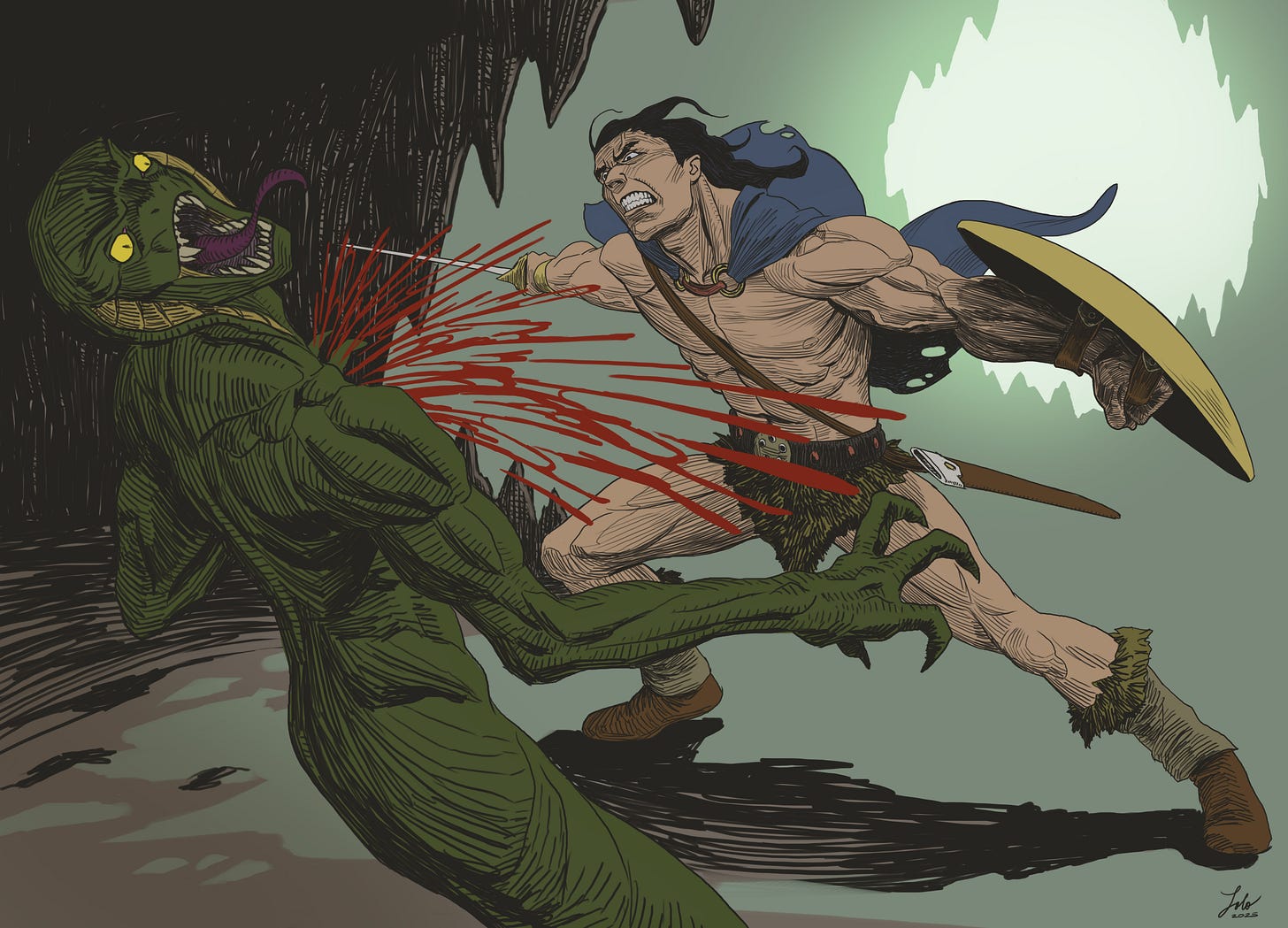
Note: I commissioned original art from Manuel “Lolo” Guzman for this one. He is incredibly talented, and I look forward to working with him again in the future. You can check out his website here.
I’ve decided to make it a point to pay real artists for real art. I hope you will consider going paid or getting a gift subscription because it will help me do that more often.
This particular piece was inspired “Worms of the Earth,” a short story by Robert E. Howard that appeared in the November 1932 edition of Weird Tales.
Fear of the unknown is mankind’s most powerful, primal emotion.
It serves as both a defense mechanism and a teacher. A warning and a reminder. Our station in the cosmos is much like a person who is standing in an infinitely vast room, black as pitch, only able to see what is illuminated by a lamp overhead. Beyond the small circle of light afoot is a Stygian world through which contemptuous eyes watch unseen but are weirdly felt by our limited senses. We don’t know what is out there. But we can hear it flitting and slithering in the dark.
The folklore of every civilization, though separated by vast gulfs of space and time, tells of the same or a very similar cast of strange liminal creatures that lurk at the edges of mankind’s domain. Dragons guarded dark caverns and mountain lairs. Mermaids lurked in the water and along shorelines. Almost all cultures have stories about various malicious beings that visit terror on sleepers. The Germanic nøkker, a shapeshifting water spirit, was said to carry people off and could be stopped by someone who spoke its true name. If knowledge is power, knowledge of the unknown is the most powerful kind.
Of course, science cleared up much of the confusion, did away with superstition. There are convincing rational explanations for all of these things. Still, something about them seems woefully unsatisfying. I do not mean to say that dragons and mermaids are real. But I suspect that certain phantasmagoria recurs throughout history everywhere because mankind senses—fears—that, even from its elevated position, it is only able to perceive the canopy of a dark forest.
Dread never dies. It only assumes different forms. In our time, they simply sound more scientific. The mathematician and physicist John von Neumann hypothesized that the reason we haven’t made contact with other intelligent life is that it has been destroyed by self-replicating probes that systematically seek out and eradicate all those foolish enough to make themselves known. In this view, the search for extraterrestrial intelligence seems like the ringing of a dinner bell. Any space-faring civilization capable of creating such awful machines would seem like gods compared to us, and we’d be right back to mermaids and dragons.
The only thing worse than being alone in the cosmos is sharing it with beings beyond the ken of mortal understanding. More frightening than the absence of divinity is the existence of a god or gods who are indifferent or hostile to huimanity.

That is where fiction, namely weird fiction, comes in.
Ursula K. Le Guin described science fiction as extrapolative in that it takes a trend or phenomenon and intensifies it for dramatic effect in order to say, “If this goes on, this is what will happen.” I think that is generally true of weird fiction, which blends the genres of science fiction, supernatural and cosmic horror, and fantasy as a means of speculating on the numinous and unknown. What if the rapping at the door wasn’t something you imagined? Cautionary tales of will-o’-the-wisps that confuse and disorient men so as to lead them to precipices seem suddenly relevant again in the age of reality-warping artificial intelligence.
No other publication has done more to inject weird fiction into our bloodstreams than Weird Tales.
Founded in 1922, it promoted and published writers from H. P. Lovecraft to Robert E. Howard, the creator of Conan, and Ray Bradbury. It’s hard to quantify the magazine’s influence on so many genres. So much is downstream of it, and yet there are many people unaware of its role in shaping their favorite stories. Lovers of weird fiction owe it an enormous debt.
It’s also hard to imagine anyone but Jonathan Maberry, my guest for this episode, being the editor of Weird Tales today.
Maberry is a prolific, New York Times bestselling, award-winning author whose books have been adapted for screen.
His story starts in a rough part of Philly in the ’60s and ’70s with a father who was a career criminal and part of the local Ku Klux Klan. At one point, Maberry was a bouncer at a strip club and a professional bodyguard.
It seems like a, well, weird start for a professional writer. Or maybe not. Upon closer inspection, it’s clear Maberry was always meant to do what he does now.
Fiction offered him an entirely different way of viewing the world. First in the form of comics and Conan books. Then, in the seventh grade, through a chance meeting with a middle school librarian who happened to be part of a writers group called the Hyperborean Legion, where he met two editors of Weird Tales and was mentored by Bradbury himself.
There are so many fascinating turns to Maberry’s story, but I don’t want to spoil our conversation, which touched on “The Unique Magazine,” why people are perennially drawn to weird fiction, the role it plays as a means of processing the world around us, and the art and craft of writing.
I will also note that Maberry has made available a huge number of writing resources, which you can find on his website under the “Free Stuff for Writers” page. If you are at all interested in writing fiction, you should avail yourselves of them.
His next book, Cold War: A NecroTek Novel, is also available now for pre-order.
I hope you’ll enjoy this one and check out Maberry’s work.












